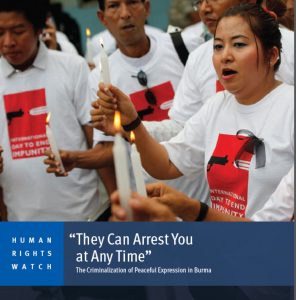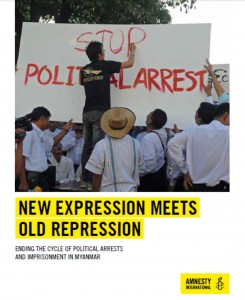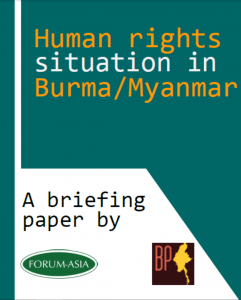International Relations (103 found)
Oral statement by Amnesty International, the Women Peace Network-Arakan and The Arakan Project in light of the review of Myanmar’s fourth and fifth combined report to the Committee on the Elimination of Discrimination against Women
Amnesty International, the Women Peace Network-Arakan and The Arakan Project welcome the opportunity to address the UN Committee on the Elimination of Discrimination against Women and to raise our concerns regarding the situation of Rohingya in Myanmar and in particular women and girls who experience discrimination on multiple fronts, including their gender, ethnicity, and religion […]
• • •Human Rights Watch: “They Can Arrest You at Any Time” The Criminalization of Peaceful Expression in Burma
 The past five years have been a time of liberalization and change in Burma. The abolition of prior censorship and a loosening of licensing requirements has led to a vibrant press, and the shift from formal military rule has emboldened civil society […]
The past five years have been a time of liberalization and change in Burma. The abolition of prior censorship and a loosening of licensing requirements has led to a vibrant press, and the shift from formal military rule has emboldened civil society […]
Report of the United Nations High Commissioner for Human Rights: Situation of human rights of Rohingya Muslims and other minorities in Myanmar
The present report, submitted pursuant to Human Rights Council resolution 29/21, examines the situation of human rights of Rohingya Muslims and other minorities in Myanmar […]
• • •Myanmar: Political imprisonment in numbers
Today, Amnesty International released the report New expression meets old repression. Here is a look at some of the key numbers behind the growing crackdown on freedom of expression in Myanmar […]
• • •Myanmar: New expression meets old repression: Ending the cycle of political arrests and imprisonment in Myanmar
 This is the summary of the Amnesty International report which highlights the pattern of politically motivated arrest and imprisonment since the start of 2014. Since it came to power in March 2011, the government in Myanmar has embarked on a major transition from five decades of authoritarian military rule towards a more open political system […]
This is the summary of the Amnesty International report which highlights the pattern of politically motivated arrest and imprisonment since the start of 2014. Since it came to power in March 2011, the government in Myanmar has embarked on a major transition from five decades of authoritarian military rule towards a more open political system […]
Testimony before House Foreign Affairs, Subcommittee on Africa, Global Health, Global Human Rights, and International Organizations: “Get it Right This Time: A Victims-Centered Trafficking in Persons Report”
Mr. Chairman and other distinguished members of the Subcommittee, thank you for inviting me to testify today. I had the honor of testifying last year, and once again my colleagues and I at Fortify Rights thank you for your leadership in working to end human trafficking worldwide […]
• • •Report of the Special Rapporteur on the situation of human rights in Myanmar
In the present report, submitted to the Human Rights Council pursuant to its resolution 28/23, the Special Rapporteur on the situation of human rights in Myanmar, Yanghee Lee, examines the developments in Myanmar since her reports to the Council, in March 2015 (A/HRC/28/72) and to the General Assembly, in October 2015 (A/70/412) […]
• • •Atrocities Prevention Report: Targeting of and Attacks on Members of Religious Groups in Burma
The situation in Rakhine State is grim, in part due to a mix of long-term historical tensions between the Rakhine and Rohingya communities, socio-political conflict, socio-economic underdevelopment, and a long-standing marginalization of both Rakhine and Rohingya by the Government of Burma […]
• • •31st Regular Session of the UN Human Rights Council Item 4: Interactive Dialogue with the UN Special Rapporteur on the situation of human rights in Myanmar, Ms. Yanghee Lee
Mr. President. FORUM-ASIA, in solidarity with Equality Myanmar and Burma Partnership welcomes the report of the Special Rapporteur. [1] We recognise the significance of the November 2015 elections and note that Burma/Myanmar is at a critical juncture in its history. We express our strong support for the Rapporteur’s time bound recommendations for the new government including tasks outlined as priorities during the first 100 days as well as those identified to be completed before March 2017.
• • •Human Rights situation in Burma/Myanmar
 The year 2015 will be remembered as a momentous year for Burma/Myanmar as the National League for Democracy (NLD), led by Daw Aung San Suu Kyi, clinched an emphatic victory in the 8 November polls. However, the main challenges that impede a full and genuine democratic transition remain.
The year 2015 will be remembered as a momentous year for Burma/Myanmar as the National League for Democracy (NLD), led by Daw Aung San Suu Kyi, clinched an emphatic victory in the 8 November polls. However, the main challenges that impede a full and genuine democratic transition remain.

 All posts
All posts